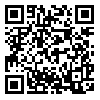Volume 21, Issue 7 (2019)
JAST 2019, 21(7): 1641-1656 |
Back to browse issues page
Download citation:
BibTeX | RIS | EndNote | Medlars | ProCite | Reference Manager | RefWorks
Send citation to:



BibTeX | RIS | EndNote | Medlars | ProCite | Reference Manager | RefWorks
Send citation to:
Hosseini F, Sadighi H, Mortazavi S A, Farhadian H. An E-Commerce SWOT Analysis for Export of Agricultural Commodities in Iran. JAST 2019; 21 (7) :1641-1656
URL: http://jast.modares.ac.ir/article-23-23050-en.html
URL: http://jast.modares.ac.ir/article-23-23050-en.html
1- Department of Agricultural Extension and Education ,Tarbiat Modares University, Tehran, Islamic Republic of Iran.
2- Department of Agricultural Extension and Education ,Tarbiat Modares University, Tehran, Islamic Republic of Iran. ,samortazavi@modares.ac.ir
2- Department of Agricultural Extension and Education ,Tarbiat Modares University, Tehran, Islamic Republic of Iran. ,
Abstract: (6632 Views)
Electronic commerce (E-commerce) is a contemporary concept with huge potential that is fundamentally changing how business is done. This paper describes robust E-commerce strategies for trading agricultural goods and services. The purpose of this study was to enhance the efficiency of E-commerce in the export of agricultural commodities. Since the SWOT method is a key tool used by businesses to formulate strategic plans, this study conducted a SWOT analysis of E‐commerce to identify the strengths, weaknesses, opportunities, and threats faced by E‐commerce in current scenarios. A random sampling method was used to select the statistical population, which was composed of 96 experts from the Ministry of Agriculture. Seventy-five questionnaires were distributed to the experts (N= 75) using Morgan and Krejsi's table, of which 59 questionnaires were filled (n= 59). The questionnaire consisted of strengths, weaknesses, opportunities, and threats to E-commerce development and it was prepared using the Delphi technique. The important results of SWOT analysis constituted a framework to help planners and managers realize their goals and enhance the export of agricultural commodities. The resulting SWOT matrix analysis was located in the area of WO (conservative strategy). Accordingly, it is recommended that for proper exploitation of environmental opportunities, organizational weaknesses should be taken into account. Some important strategies suggested based on this study are enforcing laws and providing effective incentives to reduce production costs relative to global prices as well as creating innovation in the export process using E-commerce.
Article Type: Original Research |
Subject:
Agricultural Extension and Education
Received: 2018/07/13 | Accepted: 2019/01/19 | Published: 2020/02/10
Received: 2018/07/13 | Accepted: 2019/01/19 | Published: 2020/02/10
Send email to the article author
| Rights and permissions | |
 |
This work is licensed under a Creative Commons Attribution-NonCommercial 4.0 International License. |







